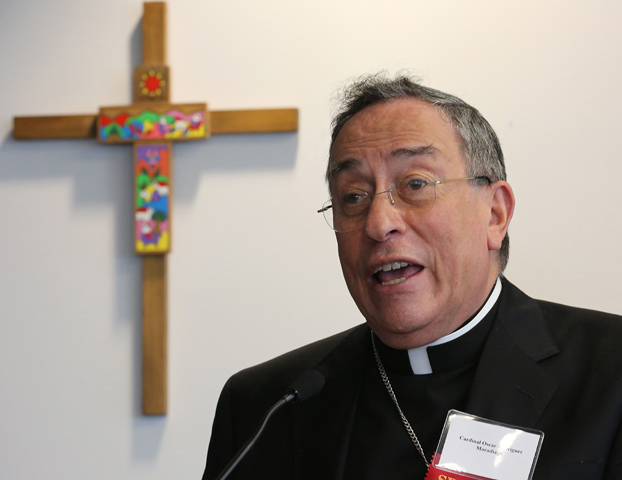
Honduran Cardinal Oscar Rodriguez Maradiaga gives a keynote address during a conference June 3, 2014, at the Bread for the World headquarters in Washington. (CNS/Bob Roller)
Revolution is stirring, and Pope Francis' right-hand man is at the helm.
"There is something new in the church," Cardinal Oscar Rodriguez Maradiaga declared on a March visit to the Cincinnati archdiocese. A "big revolution" has begun.
As I attended a public lecture, press conference, liturgy and individual meeting with the cardinal, the phrase "big revolution" began to make sense. By the end, I felt, unmistakably, that the church under Pope Francis is being shaped in radical, even unpredictable ways.
As one of the pope's longtime friends and close advisers, the cardinal offers a unique glimpse into Francis' pontificate. Currently, Rodriguez serves as archbishop of Tegucigalpa, Honduras, and president of Caritas Internationalis. Considered a papal frontrunner at the 2005 and 2013 conclaves, he was invited to chair the newly formed Council of Cardinals shortly after Francis' election.
It's easy to see why. Mercy, joy, and a poor church: Rodriguez's heartfelt reflections on Francis reveal just how deeply he shares the pope's concerns. One can recognize in the cardinal a similar spirit as Francis; even his speech is sprinkled with the imaginative language now lauded as a Francis hallmark. Rodriguez, too, offers creative images: "cardiac missionary insufficiency," a "radioactive faith" and a Holy Spirit that never takes a siesta.
It seems that Rodriguez also doesn't have time for siestas. Top on his list for the Council of Cardinals: reform of the Vatican bank and Roman Curia. It's a daunting agenda, one the cardinal approaches with steadfast resolve and even a bit of humor. Likening his work to an orchestra conductor, Rodriguez grins, "I try to have the voices in a symphony, not in a cacophony."
If the cacophony in today's church offers any indication, conducting this symphony is no easy task. Rodriguez meets the challenge, nonetheless, with a powerful and single-minded commitment. Mercy, joy and the poor church? Look closer. The trademark pillars of Francis' papacy are fruits borne of a deeper principle.
For Rodriguez and Francis, it all seems to boil down to this: encounter. Revolutionary encounter. Consistently, the cardinal returns to the heart of Christian revelation. Preaching a "personal encounter" with Christ, he calls us to seek Him as a "living person who walks with you." Encounter means revolution.
"The big revolution," he proclaims, "is how the love of Christ will enter into each one of us to transform our lives and society." This aspiration guides the cardinal's work and animates the spirit of Francis' papacy. Ultimately, it offers just the solution to that "cacophony" in our church today.
Draw the conclusions. What does it mean to be a church seeking Christ above all else?
For one, it's uncomfortable. Encounter drives us beyond our comfort zones. "Go to the peripheries!" Rodriguez exhorts. "We cannot be refugees in our own home!" With this, we are summoned to Christ at the margins of our culture, church and even our insular ideological circles.
Do we open our heart to Christ present here, too? The question invites unlikely, challenging dialogue. And in today's polarized church, it particularly demands that we venture beyond the boundaries of our competing ideological camps.
This is how it unfolds, the search for Christ. This is how it must look in a papacy that doesn't conveniently fit any of the usual boxes, including our own. If we take seriously the call to encounter Christ, we can't get trapped in our own ideology.
Rodriguez reiterates: "If you don't encounter Christ as a person, you live religion as a theory that can just be changed by another theory." Living revelation goes deeper than all our theories.
It demands vulnerability and mutual transformation -- authentic encounter with another that cannot be possessed or controlled. Ultimately, a theology rooted in encounter fuels revolution within and around us. It's also, perhaps, the only viable path forward in our fractured church.
As we see with Francis, and as I noticed with Rodriguez, this approach has far-reaching implications, particularly for how we engage social issues. Family, morality, sexual ethics, poverty -- the list goes on. Suddenly, these debates are reframed in a broader pastoral light. Rodriguez attempts this, for example, in his approach to a question on divorce and Communion. Reorienting a common impulse for immediately clear-cut, even juridical answers, he names instead the "principle issue" as how to accompany people pastorally. Fundamentally, this approach springs from a willingness to encounter Christ in another, trusting that "God is merciful and we must be persons of mercy."
The cardinal's response is not offered as a so-called politically correct answer, although even that can be a positive step. Rodriguez preached this message with tremendous passion not only to the press, but during an intimate Sunday Mass at San Carlos, a Hispanic immigrant parish in Cincinnati. He also modeled this approach in our meeting together. His willingness to encounter me was profoundly genuine and wholehearted.
Of course, this path of encounter doesn't always mean that we'll all agree -- even with Francis or Rodriguez. Can we persuade the other of our rightness? If this is our attitude, we miss the point. Encounter doesn't guarantee uniformity. Nor does it promise a church in our own image.
It does, however, create the possibility for dialogue. Gifted with travel companions on a journey far beyond both our camps, we can mutually listen, question, and grow together. We learn how to journey not only toward Christ, but in Christ encountered now beside us.
Dare we choose this Emmaus road? Not only when it's eye-opening and joyful, but also when it's maddeningly difficult? So it goes, with things that really matter.
In the end, our answer will determine the outcome of this "big revolution." For the church encompasses each of us, as well as our ecclesial leaders. "The church is not only the hierarchy," Rodriguez reminds us. Responding then to our baptismal call, let us each commit ourselves to this journey -- seeking the Christ encounter, our Easter inheritance.
[Jennifer Mertens recently completed her Master of Divinity from the Catholic Theological Union. She teaches religion at a Catholic high school in Cincinnati.]
Editor's note: We can send you an email alert every time a Young Voices column is posted to NCRonline.org. Go to this page and follow directions: Email alert sign-up.




